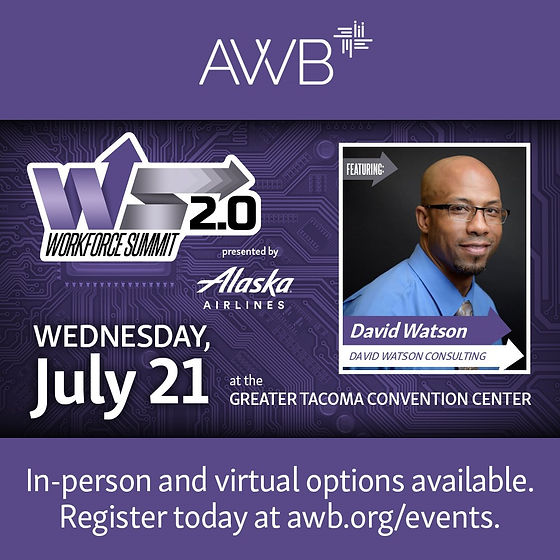Speaking Engagements
Please take a few minutes and read the comment below regarding two of my most recent speaking engagements...
2021 Association of Washington Business' Workforce Summit 2.0
2021 Mentoring Conference for Mentor Washington

David,
Your presentation was great. And, who would have known someone in the audience knew you and their bamboo had been watered by you. 😊 I loved that analogy. Very well done.
Paulette B.
Mentor Washington Blog
As we have eased into summer and moved into a season of deep breaths and slower days, I have found myself continually reflecting on the voices and stories that were shared with us during 2 wonderful days of learning and community at our conference in May.
Like many others in attendance, I was captivated by the words of David Watson’s Keynote. During my reflections this past month, I find myself coming back to Dave’s relationship with his high school wrestling coach. This man, Dave shared, had a profound impact on his high school self and future self, encouraging him to stay engaged in school and embrace the discipline that is taught in something like wrestling. For Dave, this man was more than a coach. He was also a natural mentor in his life.
During the past year and a half, there have been many conversations within the mentoring field on the impact of multi-cultural relationships and matches. Dave’s experience, like so many others, is a testament to the possible outcomes from youth of color having mentors that are of a different race. However, I find myself hesitant to stop here and celebrate that as the blanket answer to the question, “Can young people of color engage in effective and uplifting relationships with white mentors?” I believe there is danger in stopping there and that we are required to acknowledge that this Dave’s experience is not all experiences. So what is the difference? What made Dave’s relationship with his wrestling coach such a positive and meaningful one?
I think at least part of the answer was highlighted as Dave shared about a particular moment early on in his relationship where his coach brought them a special lunch from one of Dave’s favorite spots in his community. The restaurant was in Dave’s neighborhood and made some of his favorite food. Food that he had spoken about previously that was a part of his culture. In this moment, the wrestling coach showed that he was listening to Dave and that he was willing to engage and learn about his culture. Dave went on to share that in that moment he felt valued and seen.
In a field that was designed to “save” poor, mostly Black and Brown, kids by matching them up with wealthy, mostly White adults, we must understand the damage that white saviorism has enacted on our approaches to mentorship. I see the cultural values and characteristics of White America being held in higher regard than others. I have fallen into this hierarchy myself, as I justified and believed “I just what this kid to have a bright future.” However, what I didn’t understand was that as I reinforced the notion of white norms being the “successful” norms, I was simultaneously reinforcing a young child that their family and culture and practices were less-than. Reinforcing the idea that to be successful was to “make it out” of their home, neighborhood, and community.
How are we, as mentors, engaging in the family and community cultures of our mentees? Are we taking them to high-end restaurants so they can learn about “proper table manners” and yet never going to a restaurant that serves food they grew up eating? Are we providing opportunities for them to learn about our culture, but never taking the time to learn about theirs? Do we correct their language so that they sound more “professional” rather than understanding the complexities and history behind dialects? Are we holding their values and practices in equal esteem to the ones we grew up with?
When we take the time to listen and learn about our mentees, their families, and their cultures, we are showing them that who they are and where they come from are good and valuable. This in-turn teaches our mentees that THEY are good and valuable. So take the time to learn from your mentee. Learn a new dance, how to cook a new dish, about different clothing styles, or about customs. Share in those moments and seek to understand; truly understand.
Laura M.
Oh my gosh, I feel like I went on an emotional roller coaster ride just now listening to David’s story. I’m still sitting with what I heard, but I wanted to take a minute and share that you could not have picked a better presenter for this morning. Thank you!
Opening speaker for Day 2, Mr. David Watson, had a very powerful story and message that promoted inclusion and breaking down barriers in society rather than promoting more division.


